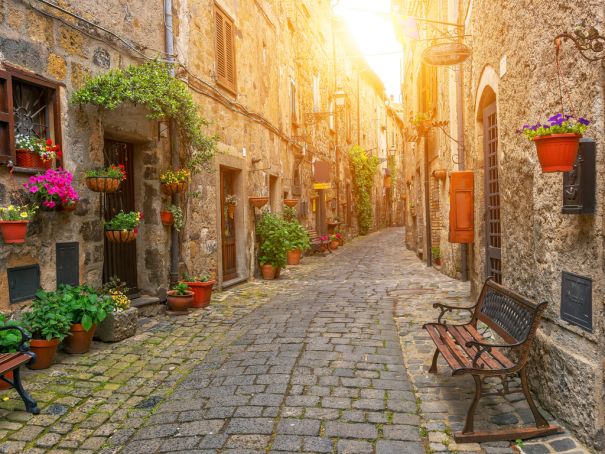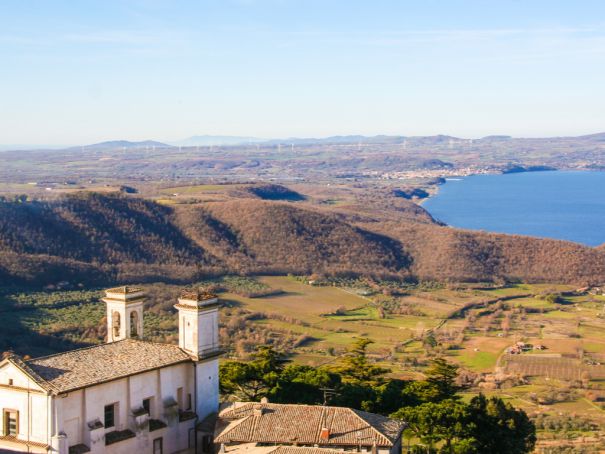Bolsena is famed for its volcanic lake and beautiful scenery.
Rome residents in search of a nearby inland destination need look no further than Bolsena. Head north up the Via Cassia to Italy’s largest volcanic lake, Lake Bolsena, whose circular 43 km shoreline practically borders on Tuscany and Umbria. Here you will find beautiful scenery, placid waters, charming old towns and good fish meals.
Bolsena town, at the head of the lake, is virtually ignored by Italian holidaymakers, but its virtues have been known to discerning northern European tourists for decades. In fact, you are likely to hear Dutch, Flemish or German spoken in the streets and restaurants. The waterfront and harbour has a rather retro aspect, reminiscent of a more leisurely era, with swathes of immaculate lawn, fountains and café tables under the trees and huge clumps of amazing blue, mauve and white hydrangeas in summer.
Bolsena, in fact, has an annual hydrangea festival, held around the last week of June when the blooms are at their best. Great hydrangea bushes also flank the rows of gigantic plane trees lining the avenue leading from the main square down to the lake. The street is named after Nicola Colesanti, a local notable, who planted the 220 plane trees along the avenue and the lakeside in 1871. Since then, these trees have never been pruned. They have grown to towering heights and their colossal trunks are twisted into natural abstract sculptures.
Bolsena’s main monument is the Cathedral of S. Cristina, dedicated to an 11-year-old girl martyred during the reign of Roman emperor Diocletian. Her yearly feast (23-24 July) is a major event, with the solemn procession carrying the statue of the saint making regular halts to witness live tableaux of the various torments she suffered, enacted by young local girls.

The building is very ancient but it has been altered many times and is now an interesting mix of different styles from early mediaeval onwards. Take time to wander around: the cathedral is a treasure-house of curiosities and works of art. It is also a shrine, deeply revered by Roman Catholic believers due to the miracle, recounted in a celebrated painting by Raphael in the Vatican Stanze, when in 1263, Pietro, a priest from Prague, was officiating at Mass when blood inexplicably began to pour out of the holy water, staining his robes and the surrounding flagstones.
The bloodstained stones are preserved in a golden shrine in the Chapel of the Miracle, accessible through an 11th-12th century marble doorway, which also leads on to the Grotto of S. Cristina with the martyr’s sarcophagus, discovered during archaeological excavations in 1880. The miracle of Bolsena was the origin of the annual feast of Corpus Domini, which celebrates what Roman Catholics believe to be the miracle of the real presence of the body and blood of Christ in the Eucharist. Held in June floral carpets are strewn along the streets of many towns to mark the occasion. In Bolsena, of course, the feast is spectacular, with a flower route stretching for three kilometres.
Before you leave the basilica, take note of the chapel dedicated to another woman martyr from Bolsena, St Mary of Peace. She was a missionary nun in China, murdered during the Boxer uprising in 1900 and canonised by Pope John Paul II in 2000.
During the summer, you can take a cruise to the lake islands, Bisentina and Martana, from Bolsena harbour. Some trips include a stop at the Rocca Farnese castle at Capodimonte and a swim or a dive in the crystalline lake waters among the local eels (anguilla), perch (persico), whitefish (coregone) and whitebait (latterini), all regularly on the menus of the local restaurants. Martana, alas, is linked to the fate of another tragic woman, the Ostrogoth Queen Amalasunta, murdered there in 534 on the orders of her husband Theodatus, who didn’t agree with her politics.
Pleasant outings around the lakeside include the old fishermen’s hamlet of Marta and the town of Capodimonte, with kilometres of grassy shore-side parks where families can rent deck chairs, cycle, swim and relax at one of the many cafés and restaurants.

Nearby Montefiascone can boast one of Lazio’s best known traditional wines. Few tour guides can resist trotting out the legend of the famous “Est! Est!! Est!!!” This odd name is attributed to a trusted servant of Cardinal Deuc who was travelling through Italy on the way to Rome in the year 1111. The cardinal had sent his man on ahead to sample the wines in the inns on their route, with instructions to mark the establishments serving good wine with the Latin “Est!” (in this case meaning “OK here”). The servant was so enthusiastic about Montefiascone vintage that he wrote “Est” three times with exclamation marks.
Truth or legend, this was the third Italian wine to gain DOC status in 1966. Today, it is exported to Japan, South Korea, Holland, Belgium and Germany. You can visit the historic Leonardi cellar on the outskirts of Montefiascone. The cellar was founded by Domenico Leonardi at the end of the 19th century and is still owned by the same family. Great grandson, Riccardo Aputini, took us on the tour of the catacomb-like tunnels, where 100,000 bottles slumber, strewn in cobweb festoons. We could almost hear the cardinal gloating.
By Margaret Stenhouse
This article was originally published in the September 2012 edition of Wanted in Rome magazine.
Cover photo Shutterstock
General Info
View on Map
Lake Bolsena: beautiful day trip from Rome
01023 Bolsena, VT, Italy
















